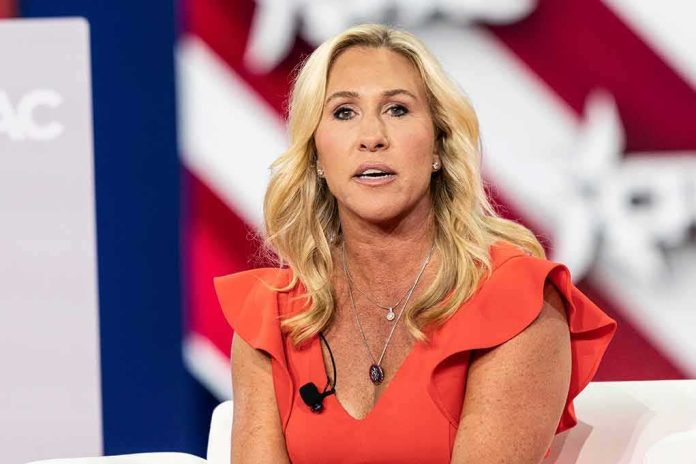
Donald Trump’s public rebuke of Marjorie Taylor Greene marks a jarring fracture in the Republican Party’s populist core, opening questions about who really sets the agenda—and whose voice echoes loudest among restless conservative voters.
Story Snapshot
- Trump accuses Greene of “losing her way” after she criticizes his focus on global issues over domestic inflation.
- The fallout exposes deeper GOP divisions and signals a potential realignment among populist conservatives.
- Greene fires back, doubling down on her “America Only” stance and denying any loss of direction.
- Other political figures and influencers, including Alexandria Ocasio-Cortez and Laura Loomer, amplify the dispute and speculate on Greene’s motives.
Trump’s Rebuke: A Public Split That Demands Attention
Donald Trump, the undisputed kingmaker of the GOP since 2016, rarely calls out loyalists by name. That changed on November 10, 2025, after Rep. Marjorie Taylor Greene lambasted both Trump and the broader party for failing to prioritize domestic economic woes, especially inflation. Trump responded pointedly, claiming Greene had “lost her way,” and suggesting she was “putting on some kind of an act.” His words landed with unmistakable force, signaling public discipline within his base—an event the Republican establishment could not ignore.
Trump’s rebuke was not merely a personal slight. It was a clear warning shot to any GOP member tempted to challenge the party’s leadership or its messaging priorities. Greene’s criticism, coming from someone long considered Trump’s fiercest defender, instantly shifted the political calculus. In the eyes of many, this was not just a spat—it was a stress test for the unity of the GOP’s populist wing, already battered by disappointing off-cycle election results and intensifying voter frustrations over the cost of living.
Greene’s Counterattack and the “America Only” Doctrine
Greene wasted no time in firing back. She insisted, “I haven’t lost my way. I’m 100% America first and only!” Her “America Only” stance, designed to resonate with voters angry about rising prices and economic uncertainty, challenged both Trump’s foreign policy focus and the party’s broader priorities. Greene’s rebuttal was not just a defense; it was a rallying cry for a new flavor of conservatism—one that puts domestic concerns front and center, even if it means defying the party’s most powerful figure.
The timing of Greene’s comments was significant. As Republicans reeled from recent electoral setbacks, her critique echoed a growing chorus of grassroots dissatisfaction. Many rank-and-file conservatives, fed up with inflation and stagnant wages, now question whether the party’s leadership truly understands their economic pain. Greene’s willingness to break ranks may embolden others, fueling speculation about a broader insurgency within the GOP.
Other Voices: Speculation, Motives, and the Broader Fallout
The Trump-Greene feud quickly drew outside commentary. Alexandria Ocasio-Cortez, never one to miss a chance to needle her rivals, speculated about Greene’s motives, while right-wing influencer Laura Loomer suggested Greene’s criticism was driven by personal ambition—perhaps a bid for higher office. These interpretations, though contested by Greene herself, have added new layers of intrigue and uncertainty to the story, raising the stakes for everyone involved.
Despite the swirl of speculation, the facts remain clear: Greene’s criticisms have not gone unnoticed, and Trump’s response signals a hardening of internal party lines. The dispute has already shifted the conversation among Republican leaders, many of whom now grapple with how to address voter frustration without inviting further internal dissent. For a party struggling to define its future, this public rupture may prove pivotal, whether it leads to reconciliation, realignment, or further fragmentation.
Implications: What the Rift Means for the GOP’s Future
The short-term impact of the Trump-Greene dispute is unmistakable: unity within the GOP’s populist wing is under strain, and the party faces new pressure to clarify its priorities heading into the next election cycle. If Greene’s criticisms resonate with other conservatives, Trump’s dominance could be challenged—not by Democrats, but by his own former allies. The long-term consequences may be even more profound, signaling a possible shift in the party’s power dynamics and the emergence of alternative voices ready to contest the status quo.
Republican voters—especially those most affected by inflation—now watch closely, weighing which leader truly speaks for their concerns. Party strategists must decide whether to double down on Trump’s agenda or adapt to the growing demand for an “America Only” approach. As the narrative continues to unfold, one thing remains certain: the Republican Party’s path forward will be shaped not only by its leaders, but by the voices willing to challenge them—even if those voices were once allies.







